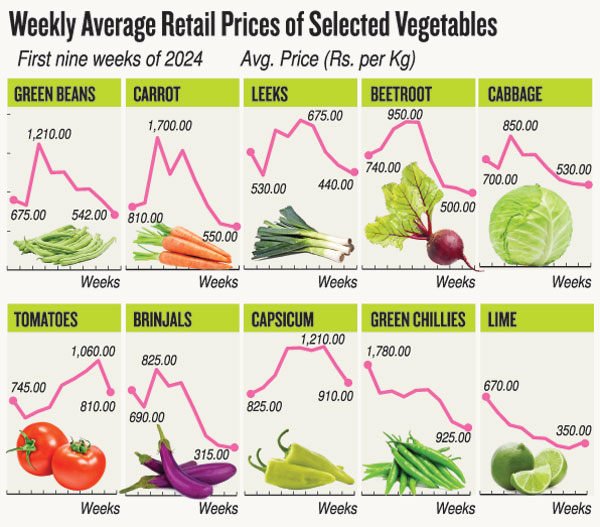News
Veggie prices come down, Nuwara Eliya farmers, traders upbeat
View(s):- Expert says high crop yield will see further price drops
By Minaza Hassan
Vegetable prices appear to be dropping in the past few weeks, contrary to predictions that normalcy in prices would only return by mid April.
“The climate has improved since the beginning of 2024, so farmers in Nuwara Eliya are planting again. Traders are taking 25% more stock of vegetables from our economic centre than in January, and the prices are expected to further decrease for the April festival, Nuwara Eliya Economic Centre Manager, Mr. Bandara, said.
Last year, heavy rains destroyed much of the vegetables, and the price of carrots reached unprecedented heights. Mr. Bandara said now that the weather is more favourable to the upcountry vegetable farmers, they are able to build up on their losses.

This year, the potato fields have yielded more harvest than in other years. The quantity of seed tubers imported from abroad is reported to be less than 30%. There are more vegetable fields in Nuwara Eliya than in other years, said a young farmer from Nuwara Eliya, Hempriyantha Attanayake.
During the latter part of 2023, many people could not cultivate due to heavy rainfall, and some people lost their cultivations. Others chose not to cultivate, anticipating the losses that could befall them, This resulted in a low supply of vegetables and a high demand, and naturally, there was an escalation in the prices, explained Peradeniya University’s Crop Science professor Buddhi Marambe.
“We have been witnessing a decrease in the prices of vegetables since January, when the rainfall started to ease and people started to cultivate. There could have been a further reduction in the prices, however, there is a 10% tax on fuel, and due to the cost of transport, the prices increased,” professor Marambe said.
The relative dryness that the upcountry is facing may have an impact on leafy vegetables but not on other crops. On the one hand, there is adequate sunlight, and if people do irrigation, the crop yield is going to be relatively high. When the crop yield is high, the supply will also be high, and we can expect relatively lower prices in the markets, he further said.
Usually, the prices of vegetables increase in the months of November, December, and January every year. This has been the case for the past 20 years, as the professor pointed out.
The next segment where vegetable prices usually see a rise would likely be mid-April, May, and June. However, this year, based on the crop cultivation trend that has taken place in the upcountry area, there is a likelihood that there will be more vegetables coming into the market towards the latter part of March and early April, so there would be a drop in prices provided there is adequate irrigation water available for the crops, he added.
These sentiments were echoed by Senior Research Officer at the Hector Agrarian Research and Training Institute (HARTI), Duminda Priyadarshana. “The decrease in prices can be explained due to the Maha season, as we are at the peak harvest season in the upcountry and lowcountry areas, he said, adding that there would be a further decrease in prices.
“Prices are a function of demand and supply,” said CEO of Advocata and economist Dhananath Fernando.
People’s income has been going down due to inflation and taxation, due to this, demand contracts. However, currently, due to the seasonal impact, prices have decreased once again, Mr. Fernando said.
While acknowledging the positive impact of the Maha season and the decrease in vegetable prices, Mr. Fernando also highlighted that the prices of imported rations remain inaccessible to the lower and middle classes due to their high prices.
“The prices of items such as green peas and chickpeas have increased. These are foods that provide a lot of energy and don’t require storage facilities, however, they are inaccessible due to high tariffs,” noted Mr. Fernando.
The best way to say that you found the home of your dreams is by finding it on Hitad.lk. We have listings for apartments for sale or rent in Sri Lanka, no matter what locale you're looking for! Whether you live in Colombo, Galle, Kandy, Matara, Jaffna and more - we've got them all!

